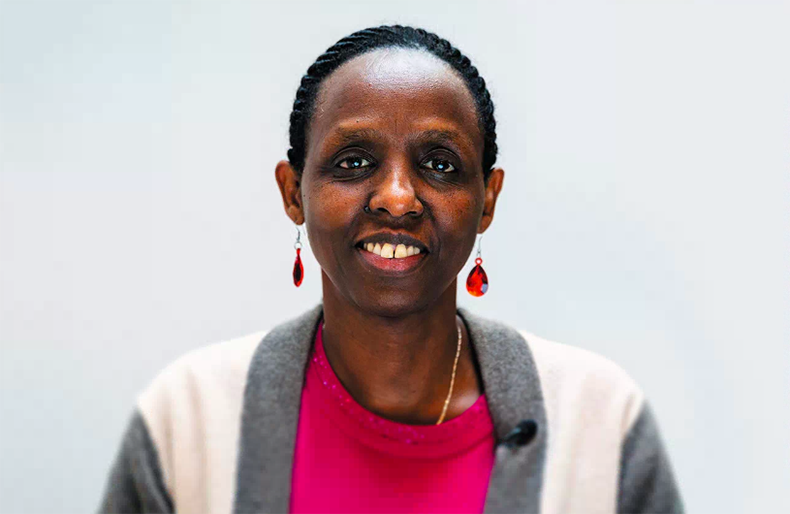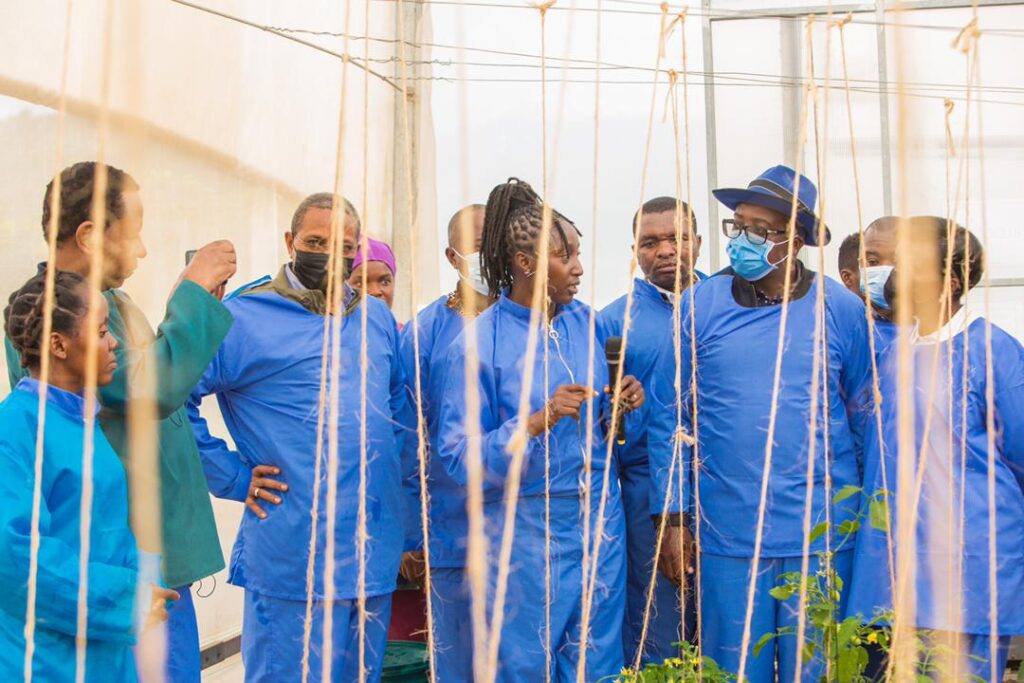
As the foundation of the food sector, fertilizer is responsible for half of the world’s food production, according to analysts. The International Fertilizer Association (IFA) says fertilizer feed about 50 per cent of the world’s population which amounts to around 20 billion meals per day. It provides almost one million jobs in production around the world. Behind this phenomenal growth are women. They are contributing greatly to the Gross Domestic Product( GDP) of African countries.

Globally, fertilizer is the largest sector of the input market. The International Fertilizer Association (IFA) estimates that between 2015 and 2019, the industry invested no less than $91 billion in new mines and fertilizer producing facilities.
While fertilizer producers have achieved many milestones in the last decade, more investors are establishing new ammonia and urea plants. This makes it one of the most highly productive agribusinesses. By increased crop production, the fertilizer industry not only boosts food security and increased consumption of more balanced diets, but also supports growth.
Behind the major technological innovations that have driven the industry in the last two decades are women who are in top managerial positions in the sector.
From Morocco to Nigeria and South Africa, the influence of women in the industry has been growing. Analysts said this is boosting food security.
The women are managing key elements at farms, mines and production sites at some of the world’s largest companies and in key university research projects.
Also, organizations such as African Development Bank (AfDB),Office Chérifien des Phosphates Africa (OCP), African Fertilizer and Agribusiness Partnership (AFAP), New Partnership for Africa’s Development (NEPAD) and the United Nations Economic Commission for Africa (ECA) are providing platforms for women to build capacities in fertilizer production, considered as an essential building block for agricultural productivity and growth.
Experts say women are driving activities to ensure abundant supply of natural gas and minerals and enabling producers to increase the supply of nitrogenand phosphate-based fertilizer such as urea, ammonia and di-ammonium phosphate (DAP).
One of them is Maria Antip, a Market Analyst with OCI N.V. Headquartered in the Netherlands and listed on Euronext in Amsterdam, OCI’s production capacity spans four continents and comprises 16.2 million metric tonnes per year of nitrogen fertilizer, methanol, diesel exhaust fluid, melamine, and other nitrogen products.
Antip noted that women have played major roles in growing the fertilizer industry to help support farmers and strengthen food systems.
Her words: “From my perspective, there is definitely a place for women in the fertiliser industry from the production plant level, to marketing, strategy, but also at the smallholder level with so many end users of fertiliser being women, especially in developing countries.
“In the 10 years I have been working in fertiliser, I have witnessed an increase in the number of women in the industry, at events, in plants, but also in the upper echelons of management. Major companies such as OCP, Yara, OCI have it as part of their environmental, social, and governance (ESG) goals to increase gender parity and the number of women in technical and leadership roles.”
Today, Marie Claire Kalihangabo is a force to reckon with in the industry. She is one of women driving change in the fertiliser industry.
She has been the Coordinator the Africa Fertiliser Financing Mechanism (AFFM) since November 2017.
AFFM is a Special Fund created by African Heads of State, during the Abuja African Green Revolution Summit in 2006. It is hosted by the African Development Bank (AfDB), Department of Agriculture and Agro- Industry.
Since 2019, she has been working with AfDB and the African Fertiliser and Agribusiness Partnership (AFAP) to ensure farmers in Nigeria and Tanzania explore a $5.4 million trade credit guarantees to support fertiliser value chains.
So far, the project has led to the enhancement of fertiliser value chains, within 700,000 smallholder farmers as final beneficiaries.
In 2020, AFFM also kickstarted a $2.2million project to provide fertiliser suppliers in Nigeria with financial support to improve supply for 200,000 smallholder farmers
The trade-credit guarantee project was AFFM’s first in the West African nation and involved 10 fertilizer suppliers, 12 hub Agro-dealers and 120 retail Agro-dealers. The project trained farmers in proper fertilizer use and other agricultural best practices.
She is not alone in the quest to ensure increased access to quality and affordable fertilizer by smallholder farmers. In the last two decades, the Regional Director and Country Representative, Eastern & Southern Africa, International Crops Research Institute for the Semi-Arid Tropics (ICRISAT), Dr. Rebbie Harawa, has done extensive work on soil fertility and improving the fertilizer industry.
Among the major Agricultural transformation engines, The Alliance for a Green Revolution in Africa (AGRA) interests is on how to increase productivity in the entire food sector. Launched in 2017, the Partnership for Inclusive Agricultural Transformation in Africa (PIATA) is an initiative of AGRA, the Bill & Melinda Gates Foundation, the Foreign, Commonwealth & Development Office (FCDO), the German Federal Ministry for Economic Cooperation and Development (BMZ), Rockefeller Foundation and USAID. ”The implementation of the Pan-African Partnership for Inclusive Agricultural Transformation in Africa PIATA was surely an important collaboration and commitment of development partners, governments, farmers and the private sector,” words from AGRA’s President Dr. Agnes Kalibata.
That same year, PIATA was piloted in Tanzania, with stakeholders renaming “PIATA Tija” or “Kilimo TIJA”, meaning solution-based agriculture in the Kiswahili language. AGRA implemented PIATA-Tija from 2017 to 2020 promoting a market-led approach to improve profitability of grain value chains in seven of Tanzania’s 31 administrative regions. These were Kigoma, Kagera, Rukwa, Katavi, Iringa, Njombe and Ruvuma regions. The project impacted over 765,000 smallholder farmers, of whom 60% were male and 40% female, by increasing their capacities to adapt to market-led production and reducing the shocks and stresses across the whole agricultural value chain.
For her, healthy soils are a crucial area to address, for Africa to reduce hunger and poverty across the continent.
Former Commissioner for Rural Economy and Agriculture, African Union Commission (AUC), Rhoda Peace Tumusiime, supports public-private partnerships on building fertilizer plants across Africa.
For her, transformative changes in agriculture and improved human nutrition would be achieved through appropriate application of fertilizer.
If women in rural areas had the same access to fertilizer as their male counterparts, Senior Agronomist, Israel Chemical Limited (ICL) Kenya) and Coordinator for SSA/Eastern Africa, International Potash Institute (IPI), Dr. Lilian Wanjiru Mbuthia, believes agricultural production could increase and the number of the hungry reduced.
Mbuthia has provided technical support for specialty fertilizer as well as trained farmers and extension service providers on soil and crop nutrition management.
A soil scientist, she specialises in agricultural management practices that enhance soil fertility, sustainable crop production and environmental quality.
The Principal Consultant, Argus Media, Aida Idrissi Kaitouni, has been part of efforts to improve access to information to African fertilizer sector. Argus is a global leader in fertilizer price and related information. Prior to joining Argus Consulting Services, she held strategy and market intelligence roles for OCP, contributing to strategic projects in the phosphate sector.
Also, the Deputy Managing Director, Chief Operating Officer (DGA), Fertial, Société des Fertilisants d’Algérie, Miss Sabrina Aramis, has been in the forefront of fertiliser production in Algeria.
Fertial is a joint venture between Spain’s Grupo Villar Mir and Sonatrach’s subsidiary Asmidal. The company has invested millions of dollars to modernize its two ammonia production sites in Arzew and Annaba, revamp its plants and improve energy efficiency.
The Director-General, International Fertiliser Association (IFC), Alzbeta Klein, has shown tremendous interest in the Africa’s fertiliser industry. She leads the global fertiliser industry towards creating and supporting productive and sustainable agriculture systems that contribute to a world free of hunger and malnutrition.
She said: “I am proud to lead International Fertilizer Association (IFA) to help the fertilizer industry and the related agribusiness value chain companies to help feed the world sustainably.
She has support in OCP Group which not only leads the continent in fertiliser market, but also promote initiatives to enhance the active participation of women in agriculture.
Almost 17 per cent of OCP’s top management is composed of women who work in various departments and cover various continents.
One of them is a financial engineering specialist and Executive Vice President, OCP, Ghislane Guedira.
She is helping the company to expand on the continent and beyond. She is setting the right example in design thinking which is helping the organisation to strengthen its fertiliser value chain to meet the needs of the agriculture sector. Her vision is a more robust fertiliser industry that encourage safe, abundant and affordable supplies.
For highly productive agriculture and balanced nutrition, fertiliser must meet quality standards.
To achieve this, the Managing Director, OCP Nigeria Fertiliser Limited, Mohammed Hettiti said the company has created a gender- friendly environment to ensure that women and men work to enhance fertiliser quality control.
Recently, OCP Group earned the first level of Economic Dividends for Gender Equality (EDGE) certification.This is considered the global standard for assessing corporate performance in terms of gender equality and the creation of equal career opportunities for female and male employees.
“Our Group is very proud of its achievement of this EDGE certification, which reflects our long- standing commitment to equal opportunity and the promotion of diversity, both internally and in our relationship with our ecosystem and local communities,” said Chief Transformation Officer, OCP Group, Nadia Fassi-Fehri.
“We are convinced that these actions contribute to the Group’s strong performance in the long-term. This first certification confirms our status as a reference Moroccan company on the African continent and in the mining sector in general.”
With more than 20,000 employees of various nationalities, and a turnover of $9.4 billion in last year, OCP Group is one of the largest private employers in Morocco and is at the forefront of gender diversity, inclusion and equal career opportunities.
